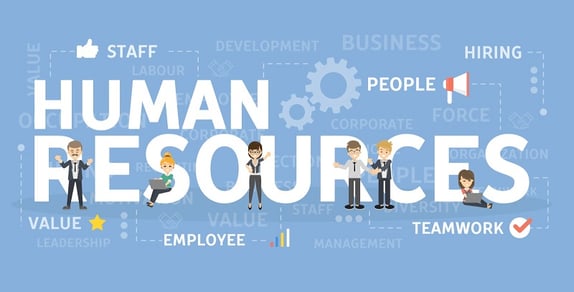Main job titles in human resources

Job roles in human resources can be numerous and diverse. Depending on the needs of the company, the department could include a range of specialists including recruitment, occupational health and safety, as well as internal communication, to name a few.
This area is also responsible for designing and implementing strategies to help the company to better manage its human capital, and from different perspectives. The functions of a human resource department are therefore crucial for the development of the business.
What skills are required to work in HR?
The work of personnel department is extremely diverse: from processing payroll, negotiating conditions or the selection of potential employees. This explains why we see a range of different profiles within the team.
The people that make up a human resources department have usually studied labour relations and human resources at university. Nevertheless, it's not uncommon to find professionals who have studied psychology, business studies, economics or even law.
In addition, it’s vital that anyone who works in personnel management can show empathy, as well as having good oral and written communication skills. According to the profession map published by the Chartered Institute of Personnel Development (CIPD), a human resources professional needs to be:
- A decisive thinker.
- A skilled influencer.
- Personally credible.
- Collaborative.
- Driven to deliver.
- Courageous enough to challenge.
- A role model - leading by example.
- Curious.
Other basic skills are also required, such as a knowledge of statistics, finance, foreign languages and experience in IT tools:
- Microsoft Office.
- Payroll management software.
- Annual leave management platforms.
- Analytical systems.
- CRM systems.
As you can see, the skills required of a human resources professional are numerous and diverse, those aspiring to work in this area should acquire them and be committed to continuous professional development.
Types of job titles in human resources
The roles and functions of an HR department vary depending on the organisation, its size and needs. According to a study, 41% of small business owners choose to do this work themselves. In contrast, SMEs may only have one person doing this job and who performs a wide range of tasks, whereas big companies normally have a large department where each member performs a specific and highly specialised role.
The same study found that even when a company has 20 employees, the human resources function is just as likely to be managed by the owner, by an employee who is neither exclusively dedicated to this area nor a personnel specialist. Nevertheless, once the company’s workforce grows to between 50 and 100 employees, there is a 55% probability of them having one person dedicated to personnel management. Kenjo recommends planning ahead for business growth and hiring a specialist to find suitable talent in order to meet business objectives.
We take a closer look the most common job roles in a HR team below.
Human resources manager
The human resources manager, also known as the HR officer, is the person responsible for the department and is managed by the company director. There main job functions include:
- Planning the company strategy in line with company objectives.
- Establishing objectives for the team and following up on progress.
- Developing and administering the department’s annual budget.
- Overseeing the internal communication plan.
- Defining recruitment protocols, internal promotion policies or workforce restructuring.
- Approving the workplace health and safety plan.
- Devising policies to create a healthy working environment.
- Monitoring the department’s key metrics.

Their typical day is usually spent between paperwork and administrative tasks, so in recent years, these professionals have been the leaders of digital transformation in the personnel arena. Human resources software plays a fundamental part in this process as it enables you to digitise and automate most of a HR officer’s work.
HR Business Partner
The HR Business Partner is a position that was conceived by Dave Ulrich over 20 years ago. This professional has a strategic role and supports all areas of the company in meeting their objectives. In other words, they help each department achieve their objectives through human capital by developing and implementing ad-hoc projects.
Responsibilities:
- Definition and implementation of new initiatives.
- Development of business strategies from a human point of view.
- Recruitment and development of career paths.
- Detecting the company's needs.
- Internal communication.
The fact is that this position is still uncommon in human resources. According to a study carried out by Roffey Park and mentioned in Personnel Today, only 47% of the managers polled said business partnering was in any way successful in the organisation. Only 26% stated the opposite.
Recruitment specialist
The recruitment specialist is responsible for candidate selection. They also oversee the development and execution of the talent acquisition strategy to capture the professionals the company needs for its growth and development.
The day-to-day tasks include:
- Determining whichprofessional profiles the company needs.
- Researching and attracting candidates.
- Preparing appealing adverts to attract candidates through the appropriate channels.
- Receiving curriculums, reviewing and filtering them, followed by selection.
- Performing selection tests, interviews or group dynamics for each position.
- Preparing reports on each candidate.
This position requires excellent organisation skills as it normally involves constant contact with scores of applicants and therefore handles a large volume of emails every day. An Applicant tracking system (ATS) is normally used to optimise this task; in other words, a CRM that is designed to manage candidates at every stage of the process and enabling a simple follow-up process.
Independent recruitment consultant
Many companies also external independent consultants to perform human resources tasks. It's an alternative that is much cheaper than having an in-house department, which makes it ideal for small or medium-sized companies with lower budgets.
Training and development specialist
The training and development specialist, “talent manager” or “training and development officer” focuses on designing programs to provide employees with the tools and knowledge they need to grow and take on new challenges within the company. The job involves developing personalised plans and promoting their implementation.
The main tasks are:
- Detecting training needs within the company.
- Developing training and education plans.
- Assessing the impact of educational initiatives.
- Managing the budget allocated for the training plan.
- Preparing paperwork and processing grants.
Labour relations and payroll specialist
A labour relations expert knows the ins and outs of UK Employment Law perfectly, and all other labour-related laws; they are therefore in charge of drawing up contracts, negotiating conditions, assigning annual leave and, of course, ensuring that every employee is paid.
The job involves:
- Organising all procedures related to social security.
- Working with the company’s health and accident insurers.
- Monitoring metrics related to absenteeism.
- Managing payslips.
- Drawing up work contracts.
- Maintaining and updating the applicant database.
- Allocating annual leave.
- Keeping track of absences, sick leave or paternity/maternity leave.
Internal communications specialist
Internal communication is extremely important for the creation of a good work climate, some companies therefore hire a professional specifically for this task. Apart from managing communication between different teams, this professional is also responsible for creating channels through which employees can express themselves and feel that the company is listening.
The role of the internal communications specialist includes:
- Defining the company’s internal communication policy.
- Implementing the communication plan.
- Supplying content for the communication channels.
- Proposing initiatives that help to raise awareness about the activities taking place within the company.
ICT specialist
Another role that is becoming more and more common in human resources is the ICT specialist, who is responsible for guaranteeing security and correct operation of the digital tools used in the department. The field of personnel management now relies increasingly on cloud-based tools and uses big data or artificial intelligence on a daily basis; for this reason, it's important to have a specialist that masters most of these technologies and knows how to get the best from them.
Occupational health and safety specialist
A human resources department must have a professional dedicated to complying with occupational health and safety legislation. Their responsibilities are:
- Fostering cooperation between workers, middle management and senior management.
- Initiating action plans to comply with occupational health and safety regulations.
- Carrying out training programmes to ensure that all employees are aware of and comply with these regulations.
- Ensuring the validity of all documents related to the subject and be prepared for possible inspections.
Digitise your HR department with Kenjo
A great deal of tasks carried out by the human resources team can be digitised, saving time and enabling them to be much more efficient at their job.
According to a report by KPMG, two thirds of the HR managers interviewed say they are involved in the digital transformation of the sector. And 40% of them already have a digitisation plan for the department.
New technologies are here to stay and make your day-to-day life simpler, leaving you to spend more time on what really is more important. Kenjo can help you save up to 40% of the time spent on administrative tasks such as payroll, and relief, etc. Our software works for you, while you focus on creating the strategy your company needs. Try Kenjo and enjoy all its advantages.


